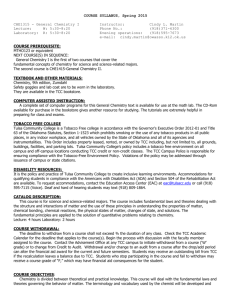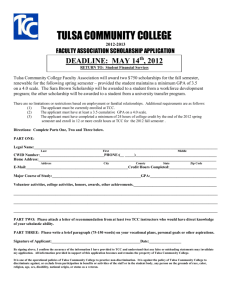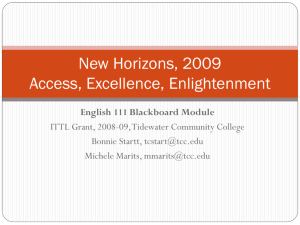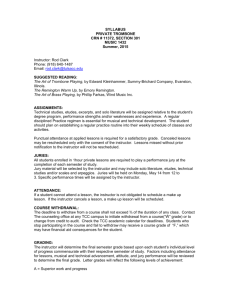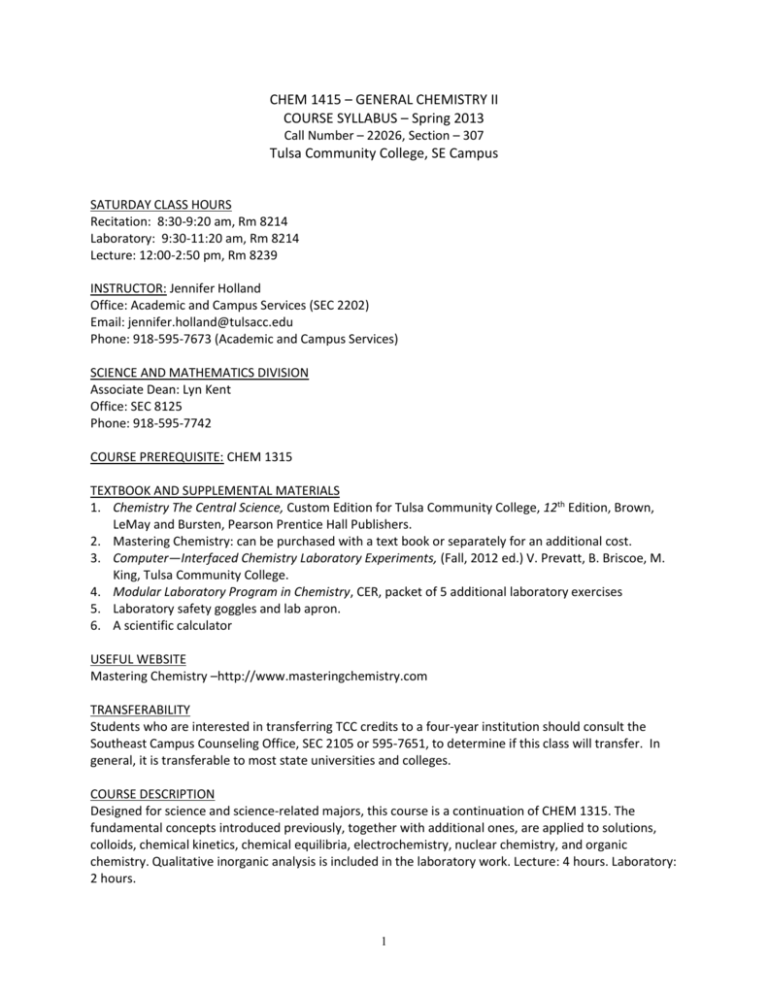
CHEM 1415 – GENERAL CHEMISTRY II
COURSE SYLLABUS – Spring 2013
Call Number – 22026, Section – 307
Tulsa Community College, SE Campus
SATURDAY CLASS HOURS
Recitation: 8:30-9:20 am, Rm 8214
Laboratory: 9:30-11:20 am, Rm 8214
Lecture: 12:00-2:50 pm, Rm 8239
INSTRUCTOR: Jennifer Holland
Office: Academic and Campus Services (SEC 2202)
Email: jennifer.holland@tulsacc.edu
Phone: 918-595-7673 (Academic and Campus Services)
SCIENCE AND MATHEMATICS DIVISION
Associate Dean: Lyn Kent
Office: SEC 8125
Phone: 918-595-7742
COURSE PREREQUISITE: CHEM 1315
TEXTBOOK AND SUPPLEMENTAL MATERIALS
1. Chemistry The Central Science, Custom Edition for Tulsa Community College, 12th Edition, Brown,
LeMay and Bursten, Pearson Prentice Hall Publishers.
2. Mastering Chemistry: can be purchased with a text book or separately for an additional cost.
3. Computer—Interfaced Chemistry Laboratory Experiments, (Fall, 2012 ed.) V. Prevatt, B. Briscoe, M.
King, Tulsa Community College.
4. Modular Laboratory Program in Chemistry, CER, packet of 5 additional laboratory exercises
5. Laboratory safety goggles and lab apron.
6. A scientific calculator
USEFUL WEBSITE
Mastering Chemistry –http://www.masteringchemistry.com
TRANSFERABILITY
Students who are interested in transferring TCC credits to a four-year institution should consult the
Southeast Campus Counseling Office, SEC 2105 or 595-7651, to determine if this class will transfer. In
general, it is transferable to most state universities and colleges.
COURSE DESCRIPTION
Designed for science and science-related majors, this course is a continuation of CHEM 1315. The
fundamental concepts introduced previously, together with additional ones, are applied to solutions,
colloids, chemical kinetics, chemical equilibria, electrochemistry, nuclear chemistry, and organic
chemistry. Qualitative inorganic analysis is included in the laboratory work. Lecture: 4 hours. Laboratory:
2 hours.
1
GENERAL EDUCATION GOAL STATEMENT
General Education courses at TCC ensure that our graduates gain skills, knowledge, and abilities that
comprise a common foundation for their higher education and a backdrop for their work and personal
lives. TCC’s General Education goals are: Critical Thinking, Effective Communication, Engaged Learning,
and Technological Proficiency.
GENERAL COURSE OBJECTIVES
Chemistry is divided between theoretical and practical knowledge. This course will deal with the
fundamental laws and theories governing the behavior of matter. The terminology and vocabulary used
by the chemist will be developed and applied. The technique for solving quantitative problems relating
to chemistry will be presented. For this reason, a good ability to apply College Algebra is essential.
During the laboratory sessions the student will have the opportunity to perform hands on experiments.
ATTENDANCE POLICY
Students registered for this course should attend regularly. Absence from the first 2 weeks of class will
be reported to the Registrar’s office and the Financial Aid Office. If a student is excessively absent the
instructor will initiate administrative withdrawal of the student, which could affect your financial aid
status. Concepts presented early in the course must be understood to understand material presented
later in the course.
CLASSROOM ETIQUETTE
Please arrive on time and turn off all cell phones. Refrain from talking to your classmates during the
lecture part of the class or when a student is asking or answering a question. If you have a question,
would like to answer a question, or have a comment on the topic being discussed raise your hand to be
given the opportunity to participate.
ACCEPTABLE USE OF COMPUTER SERVICES
Access to computer services is a privilege granted to TCC faculty, staff, and students Use of TCC
computing resources is limited to purposes related to the College’s mission of education, research, and
community service. Student use of technology is governed by the Computer Services Acceptable Use
Statements/Standards found in the TCC Student Code of Conduct Policy Handbook. This handbook may
be obtained by contacting the Dean of Student Services office.
EMAIL
All TCC students receive a designated Microsoft Exchange email address (example:
firstname.lastname@tulsacc.edu). All communications to you about TCC and course assignments will be
sent to your Exchange email address; and you must use Exchange email to send email to, and receive
email from, the instructor regarding this course. This will be the main avenue of communication
between instructor and student. Students should regularly check your Exchange email for course
updates and reminders.
PROCEDURE TO FOLLOW IN CASE OF INCLEMENT WEATHER
TCC rarely closes. If extreme weather conditions or emergency situations arise, TCC always gives
cancellation notices to radio and television stations. This information is also posted on the TCC website.
2
STUDENTS WITH DISABILITIES
It is the policy and practice of Tulsa Community College to create inclusive learning environments.
Accommodations for qualifying students in compliance with the Americans with Disabilities Act (ADA)
and Section 504 of the Rehabilitation Act are available. To request accommodations contact the
Education Access Center (EAC) at eac@tulsacc.edu or call (918) 595-7115 (Voice). Deaf and hard of
hearing students may text (918) 809-1864.
INSTITUTIONAL STATEMENT
Each student is responsible for being aware of the information contained in the TCC Catalog, TCC
Student Handbook, and semester information listed in the Class Schedule.
WITHDRAWAL, AUDIT, AND INCOMPLETE POLICY
The deadline to withdraw from a course shall not exceed ¾ the duration of any class. Check the TCC
Academic Calendar for the deadline that applies to the course(s). Begin the process with a discussion
with the faculty member assigned to the course. Contact the Advisement Office at any TCC campus to
initiate withdrawal from a course ('W' grade) or to change from Credit to Audit. Withdrawal and/or
change to an audit from a course after the drop/add period can alter the financial aid award for the
current and future semesters. Students may receive an outstanding bill from TCC if the recalculation
leaves a balance due to TCC. Students who stop participating in the course and fail to withdraw may
receive a course grade of “F,” which may have financial aid consequences for the student.
ACADEMIC DISHONESTY AND MISCONDUCT
Academic dishonesty (cheating) is defined as the deception of others about one’s own work or about
the work of another. Academic dishonesty or misconduct is not condoned or tolerated at campuses
within the Tulsa Community College system. Tulsa Community College adopts a policy delegating certain
forms of authority for disciplinary action to the faculty. Such disciplinary actions delegated to the faculty
include, but are not limited to, the dismissal of disrespectful or disorderly students from classes. In the
case of academic dishonesty a faculty member may:
Require the student to redo an assignment or test, or require the student to complete a
substitute assignment or test.
Record a "zero" for the assignment or test in question;
Recommend to the student that the student withdraw from the class, or administratively
withdraw the student from the class;
Record a grade of "F" for the student at the end of the semester. Faculty may request that
disciplinary action be taken against a student at the administrative level by submitting such a
request to the Dean of Student Services.
LABORATORY SAFETY PRINCIPLES
1. Students must follow all guidelines listed on “Safe Lab Practices” handout discussed and signed
on the first day of laboratory.
2. Students must purchase and wear goggles and a lab apron during labs. In addition, open-toed
shoes or sandals and shorts are not allowed in the lab.
3. Students must always clean up your station and laboratory supplies before leaving.
4. Students wearing improper clothing, not wearing goggles, or not following safe lab practices will
not be allowed to participate and will forfeit the points associated with that laboratory exercise
with no possibility of make up!
3
MAKE-UP AND LATE ASSIGNMENT POLICY
1. No assignment (laboratory experiment or homework) will be made up unless the following three
requirements are met: 1) you notify me verbally, by telephone, or by email within 24 hours of
the absence; 2) the absence is due to participation in an official University sponsored event,
serious illness or hospitalization, automobile accident, serious illness or death in the family, or
other reason which the instructor deems to be valid; and 3) you provide documentation to
support the reason for your absence upon or before returning to class.
2. A makeup assignment will be given for any laboratory missed due to an excused absence (meets
requirements in #1). This assignment will be distributed mid-semester and is due 1 week prior
to the end of the semester. Students with unexcused absences will not be allowed to perform
the make-up assignment and a grade of zero will be given for the missed laboratory.
3. Exams can be made up only prior to the exam date. Exams cannot be made up once they have
been administered to the class. The final exam cannot be made up.
4. Late arrivals are a disruption to class. Assignments that are turned in after the start of class
(lecture or laboratory) will be considered late and have a deduction of 1.5 points (1 letter
grade). Assignments not turned in on the date due will receive a grade of zero.
5. Any questions regarding a homework, exam, or laboratory grade must be addressed within 14
days of receiving the graded assignment.
EVALUATION METHODS
1. Homework: Specific homework problems at the end of each chapter will be assigned for grading
through Mastering Chemistry. These homework assignments are intended to give the student
practice on major concepts discussed in the chapter. These assignments will not contain all
material discussed in the chapter and additional study/practice time will be needed for the
student to succeed in the course. A student has 5 opportunities to submit a correct answer for
each question within mastering chemistry homework. Each wrong answer will slightly reduce
the students score for that question. There will be 9 total homework assignments at 20 points
each.
2. Laboratory: Laboratory work will be completed during the assigned laboratory period. Reports
for the labs will consist of submission of data obtained with pertinent observations and
calculations and answers to post-lab questions. Lab reports will be due at the beginning of the
next lab period. There will be 12 graded laboratory assignments worth 10 points each.
3. Extra Credit: Mastering Chemistry Introduction (up to 6 points)
4. Examinations:
a. Lecture examinations will cover the lecture and lab material. Exams will consist of short
answer and problem solving/calculation questions. There will be 4 lecture examinations
worth 100 points.
a. The final exam is a southeast TCC campus common final (written by chemistry faculty).
It is a 40 question multiple-choice exam.
GRADING SCALE
Laboratory
Homework
Exams
Final exam
Total
GRADING SYSTEM
90.0 – 100.0%
80.0 – 89.9%
70.0 – 79.9%
60.0 – 69.9%
50.0 – 59.9%
120 points
180 points
400 points
40 points
740 points
4
A
B
C
D
F
TENATIVE HOMEWORK SCHEDULE
The instructor may change the semester homework schedule at any time by verbal or written
notification.
Chapter
Intro
11
13
14
15
16
17
19
20
21
Open Date &Time
January 19 @ 2:00 pm
January 19 @ 2:00 pm
January 26 @ 2:00 pm
February 2 @ 2:00 pm
February 9 @ 2:00 pm
February 23 @ 2:00 pm
March 16 @ 2:00 pm
March 30 @ 2:00 pm
April 6 @ 2:00 pm
April 20 @ 2:00 pm
Due Date/Time
January 26 @ 11:59 pm
January 26 @ 11:59 pm
January 2 @ 11:59 pm
February 9 @ 11:59 pm
February 23 @ 11:59 pm
March 16 @ 11:59 pm
March 30 @ 11:59 pm
April 6 @ 11:59 pm
April 20 @ 11:59 pm
April 27 @ 11:59 pm
TENATIVE SEMESTER SCHEDULE
The instructor may change the semester schedule at any time by verbal or written notification.
Week
Date
Lecture Topic
Laboratory
Laboratory
(Chapter Number – Title)
(Experiment Title)
Start Time
1
Jan. 19 Ch. 11 – Intermolecular Forces
Syllabus Lab Safety Video
8:30 am
2
Jan. 26 Ch. 13 – Properties of Solutions
Graphical Analysis
10:00 am
3
Feb. 2
Ch. 14 – Chemical Kinetics
Ternary Mixture*#
9:00 am
4
Feb. 9
Ch. 15 – Equilibrium
Freezing Point
9:30 am
5
Feb. 16 Exam #1 – Ch. 11, 13, & 14
Kinetics*#
9:30 am
#
6
Feb. 23 Ch. 16 – Acid and Bases
Equilibrium Constant
9:30 am
7
Mar. 2 Study for Exam 2
Acid/Base Titration
10:00 am
#
8
Mar. 9 Exam #2 – Ch. 15 & 16
Total Alkalinity
10:00 am
9
Mar. 16 Ch. 17 – More Equilibria
Buffers*
10:00 am
10
Mar. 23
University Holiday – No Classes
11
Mar. 30 Ch. 19 – Chemical Thermodynamics
Qualitative Analysis#
9:30 am
#
12
Apr. 6
Ch. 20 – Electrochemistry
Avogadro’s Number
10:00 am
13
Apr. 13 Exam #3 – Ch. 17 & 19
Electrochemistry*#
10:00 am
14
Apr. 20 Ch. 21 – Nuclear Chemistry
Radioactivity (dry lab)
TBA
15
Apr. 27 Ch. 25 – Organic Chemistry
Organic Structures (dry lab)
TBA
16
May 4
Exam #4 – Ch. 20 & 21
TBA
17
May 11
Common Comprehensive Final Exam
TBA
*There is a prelab assignment that must be completed before coming to class. I will sign completed
prelab questions as students enter the classroom.
#
There is information online regarding this lab. This information could be: a handout (needs to be
printed prior to coming to lab), example calculations, or extra information. Be sure to look over this
information prior to coming to class.
5

